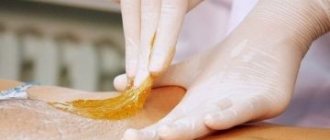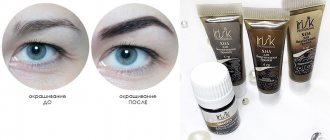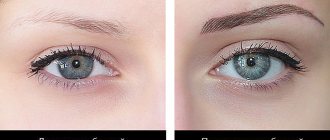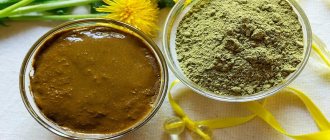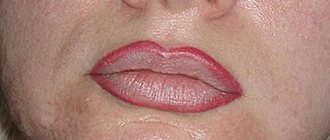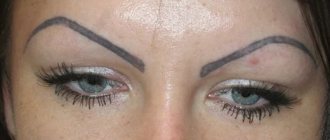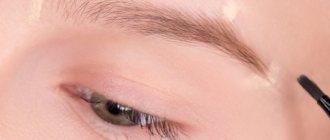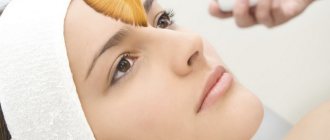Permanent makeup is now on the wave of popularity. A successful eyebrow tattoo can advantageously emphasize the advantages of one’s appearance, make the eyes more expressive and correct the shape of the face. Sometimes the result obtained does not meet expectations and you have to think about removing the tattoo. Is it possible to do this at home?
When should a tattoo be removed?
The procedure for applying permanent makeup should only be carried out by an experienced professional who has completed a special training course. However, no one is immune from mistakes. Even after visiting an expensive beauty salon, the client may remain dissatisfied with the tattoo done. Most often, removal is resorted to in the following cases:
- Asymmetrical eyebrows. This type of tattoo does not look aesthetically pleasing. Eyebrows may vary in shape and thickness, which often happens when the coloring is applied while lying down.
- Uneven pigment. An unprofessionally applied tattoo looks unnatural. Color may have different saturation.
- Not the right shade. Not every master is able to choose an eyebrow dye to match the color type of the client’s face. Permanent makeup may look too vulgar or inappropriate.
- Change of image. Fashion is changing: a few years ago eyebrows were thin, today thicker ones are preferable. With a change in hairstyle, you may also need a new eyebrow tattoo.
- Modern application methods. The beauty industry is developing, more advanced technologies are appearing. And to try something new, you need to remove the old.
Cosmetology offers various hardware methods for removing paint from under the skin: laser, remover. Such procedures are not cheap, so sometimes the idea comes to try to get rid of unwanted tattoos at home. There are many methods, but their safety is questionable.
The need to remove tattoos
@pm.tatyaj
It is recommended to apply permanent makeup only to a qualified professional, otherwise the tattoo may need to be removed later. Removing old tattoos is a rather complicated procedure. To effectively remove paint, it is recommended to perform the manipulation in a salon environment.
https://www.instagram.com/p/B189lD7nVsU/?utm_source=ig_web_copy_link
In what cases is it necessary to get rid of a permanent:
- The lines turned out to be asymmetrical - the result does not look aesthetically pleasing, the arcs have differences in length and width, are located too close or far away.
- The paint was applied unevenly, there is a difference in the brightness of the shade - in this case, it is better to remove the incorrectly applied pigment and after healing, cover up the tattoo.
- Incorrectly chosen shade - an incorrectly used color looks unnatural. If the pigment is of poor quality, the shade changes over time - it becomes pinkish or bluish.
- Changing the image - with changing fashion trends, eyebrow fashion also changes, so it may be necessary to remove the old eyebrow tattoo to make a new shape.
- The covering of an old eyebrow tattoo was performed poorly - filling in an unsuccessful result with a light pigment is not recommended, since over time dark spots from the paint may appear on the skin.
There are various methods for removing paint from skin - the most effective options include laser or chemical removal.
https://www.instagram.com/p/B3b1j4yJFts/?utm_source=ig_web_copy_link
On average, the result of a tattoo lasts about 3-4 years, so if the result is unsuccessful, it is better to remove them immediately after healing.
The need for removal arises immediately after the procedure or after a while. The result often does not meet expectations; the lines look too bright and unnatural. Irregular shape makes the face visually older.
Laser line removal is considered an unpleasant and expensive, but effective procedure. During the action, a burning sensation and discomfort are felt. Removal with a remover involves injecting a solution under the skin to remove the dye.
https://www.instagram.com/p/Btk_ClOgs63/?utm_source=ig_web_options_share_sheet
Bleaching liquid for removal
You can buy a remover in every tattoo and beauty salon. This is a drug for removing pigment from under the skin. The remover interacts with paint particles and gradually pushes them to the surface of the dermis. The master performs the procedure of introducing the remover using a tattoo machine under the skin to the depth of the paint. At home, the following procedure is suggested:
- lubricate the skin around the eyebrows with Vaseline;
- soak a cotton swab in remover;
- Carefully apply the drug to the pigment on the eyebrows.
The procedure must be carried out 3 times a day for a month.
Under the influence of the remover, a crust forms on the eyebrows, which is strictly prohibited from being peeled off. Otherwise, scars and scars cannot be avoided.
The method is not ideal: you can only lighten the pigment by a couple of tones, and you won’t be able to predict what shades will appear after the procedure. The advantage of the remover is that it selectively affects the pigment without affecting the blood vessels and inner layers of the epidermis.
The remover should not be used by persons with chronic blood diseases, skin diseases of infectious and non-infectious etiology. Pregnant and lactating women should use this method of lightening with caution.
Advantages and disadvantages of home breeding
Girls with sparse hair resort to permanent makeup. With the help of a popular procedure, it is possible to change the appearance, create the desired shade, and correct the shape of the face. The session is complex and requires skill from the specialist. One wrong acupuncture or the wrong shade will spoil the impression of the result and you will have to get rid of the eyebrow tattoo. The process is done in a salon, but you can remove it yourself at home.
The reasons for washing off permanent eyebrow makeup are usually unsuccessful injection, errors in drawing the shape (different lengths, widths), uneven pigment, unnatural shade. Girls often have to remove the old permanent in order to apply a new one.
It is possible to remove eyebrow tattoos yourself at home, but there are advantages and disadvantages:
| pros | Minuses |
| Availability of tools for mixing at home. Some products can be found in the medicine cabinet or kitchen. | Washing off eyebrow tattoos at home is fraught with the development of an allergic reaction. The chosen product does not always have the desired effect on the epidermis, causing irritation and itching. |
| You can remove or lighten eyebrow pigment at minimal cost. | The use of some components may leave a scar, burn, or scar on the skin. |
| There are no restrictions during the reduction of the permanent (you can sunbathe, swim, wash), unlike other methods. | In reality, it is possible to remove tattoos from eyebrows at home in three months. |
| Following the rules when using home techniques will give good results. | Inconvenience of use. Some methods require regular application, which is not always possible in the workplace. |
| No positive result. Sometimes the chosen method does not remove the pricking or pigment from the skin. |
Thanks to the positive aspects, girls with unsuccessful eyebrow tattoos successfully wash off the permanent at home.
Removing tattoos using hydrogen peroxide
A solution of hydrogen peroxide is used to remove pigment, but it must be handled very carefully. Concentrations of the active ingredient greater than 3% may cause serious burns. This method is effective only in case of fresh tattoo removal. The procedure goes like this:
- the area around the eyebrows is lubricated with a rich cream;
- Using a cotton swab, apply peroxide with three touches to the painted areas;
- After treatment with peroxide, cream is applied to the eyebrows.
Manipulations are carried out 3-5 times a day. If the skin is sensitive, then peroxide is mixed with milk. The first results will become noticeable in a few weeks.
If redness appears on the eyebrows, you must stop the procedure immediately!
It is worth knowing that the drug can cause allergic reactions not only at the site of use, but a rash appears throughout the body. Peroxide is for external use only; when injected under the skin, atomic oxygen is released, which can cause blockage of blood vessels.
Answers to popular questions
What might make you want to remove tattoos at home?
The reasons may be related to a change in the color of the pigment, the shape of the eyebrows, or even the appearance of an allergy to the dye.
Is it possible to remove a tattoo at home?
It is impossible to completely remove tattoos at home; the pigment is only partially removed; to do this, you must strictly follow the instructions and not violate them. But no one can guarantee the result. For precise pigment removal, go to a salon.
What are the ways to remove tattoos at home?
There are methods on the Internet using iodine, salt and hydrogen peroxide. You can use them at your own peril and risk.
Lightening with iodine
This method is considered more gentle compared to the aggressive effects of remover or hydrogen peroxide. Method of application: a cotton swab is moistened with iodine, the colored skin is wiped 2-4 times a day. Areas that do not need to be treated are lubricated with cream or Vaseline. Lightening a tattoo using this method will take more than one month. It all depends on the shade, depth and chemical composition of the dye.
When using iodine as a bleach, there are several important points to consider:
- iodine is taken only in 5% concentration;
- do not touch skin that has not been treated with pigment, so as not to increase the area of the burn;
- peeling will appear on the eyebrows, which cannot be peeled off.
Peeling is a sign of the process of death of the upper layers of the skin. The treated area is lubricated with Bepanten or Actovegin.
Any skin rashes in the tattoo area are a contraindication to the use of iodine as a method of pigment lightening. If you are allergic to iodine, use this method is also prohibited.
Rules for caring for a tattoo after its removal
After removing the pattern, the skin is damaged in one way or another. In order for it to heal properly and not leave a scar after tattoo removal, proper care is necessary.
After laser resurfacing, swelling and hyperemia (redness) appear on the skin. If the procedure was carried out in areas where the skin is thinnest, for example, on the eyelids, it is recommended to use special drops and cooling compresses. On other parts of the body where the skin is not so sensitive, you need to use healing products.
After the pigment is removed, the skin is especially dry. Therefore, if you previously used regular soap, during healing, cosmetologists recommend using baby soap with a lower sulfate content. And it is also better to give up decorative cosmetics - it is unknown how their components will affect injured skin.
To soothe the inflamed area and remove swelling, use anti-burn products - pharmaceutical gels and ointments, for example, Fermenkol gel.
It is especially important during the healing stage not to scratch or tear off the resulting crust; it is better not to touch the injured area at all. It is contraindicated to seal the damaged area with a plaster or cover it with a bandage; the skin needs to breathe.
In addition to these precautions, during rehabilitation you will have to abandon:
- solarium and exposure to ultraviolet radiation in the open sun;
- various skin steam treatments - exclude baths, saunas, hammams, swimming pools and fitness;
- any care products other than those prescribed by the doctor.
If a bruise occurs after tattoo removal, it’s okay. The main thing is not to disturb the wound, keep it clean, and it will soon heal. Do not engage in treatment under any circumstances and strictly follow the instructions of the specialist who performed the laser correction.
Removing pigment with celandine
Celandine is known for its beneficial properties and is often used to treat skin diseases. There is an opinion that using celandine tincture you can remove pigment. The tattoo is cauterized with a cotton swab; celandine should be applied 3-4 times a day only to the pigmented area, avoiding clean skin. After 10 minutes, you need to wash your face and apply a sterile bandage.
Manipulations should be carried out with caution, because celandine damages the upper layer of the epidermis. You should know the following about medicinal tincture:
- celandine is very poisonous;
- may cause skin burns;
- after frequent skin treatments, scars remain;
- removal efficiency is quite low.
The removal process will take at least two months, and the scars may remain visible for a long time. It is recommended to use Contractubex during the recovery period.
Celandine contains many bioactive substances, many of which can be strong allergens. Therefore, people prone to such reactions should use this method of tattoo removal with caution. The same applies to pregnant women and those with skin diseases.
Tattoo removal methods
Tattooing is an ancient tradition of decorating the body, and methods of tattooing also go back centuries. Our ancestors did not think about whether scars remained after tattoo removal, so folk remedies are quite harsh:
- Just cut off the skin with a knife. The procedure was so painful that the person was tied up, vodka was poured over the desired area, and he was cut. It is not surprising that the scar could be twice the size of a bad tattoo.
- Salt compresses. Salt not only corrodes paint, but also injures epidermal tissue.
- Iodine nets.
- Manganese dressings.
- Celandine juice.
It is important to remember that using the methods listed above, you cause more damage to the skin than a needle and paint, severely injuring it. Damaged tissues may not heal properly - due to external influences, the normal production of collagen, the main building material of our skin, is disrupted.
Thus, hypertrophic and keloid scars arise: an undesirable relief represented by excess collagen. Such scars rise above the skin level, are red or bluish in color, and cause itching and discomfort. Read more about how to deal with keloid scars in our article: Treatment of keloid scars.
Modern cosmetological methods of tattoo removal are more humane:
- Cryoremoval. Removing a tattoo using liquid nitrogen - during interaction with it, the cells freeze and die along with the injected pigment. After tattoo removal, the scars will definitely remain, they will have to be removed separately.
- Electrical processing. Burning of skin cells with high voltage current. The process is painful, but tolerable. After the procedure, rough scars remain.
- Treatment with chemicals. With an experienced master, there should be no scars. The meaning of the procedure is to rub substances into the skin that discolor the paint.
- Dermabrasion. Scraping the stratum corneum of the epidermis with a cutter with a diamond tip. If the puncture with paint was made shallowly, then there will be no scars left. However, the procedure is painful and will require several sessions followed by long-term rehabilitation.
- Laser. The most expensive method, but it is one of the most effective. He is able to remove the drawing almost without a trace. But even after laser resurfacing, scars often remain that require correction.
It’s better not to skimp on your appearance: celandine and other folk remedies can do more harm than help. The same applies to an incorrectly selected cosmetic procedure.
How do you know if a tattoo removal scar will remain?
A mixture of celandine and iodine for tattoo removal
Celandine and iodine affect the upper layers of the skin, actually burning them along with the pigment. There is a technique where these two substances are used simultaneously, aggressively affecting the epidermis. For the removing mixture, take 1 teaspoon of iodine and 3 drops of celandine tincture. The lightening composition is applied to the tattoo several times a day.
This method can get rid of unwanted coloring, but the results may be as follows:
- chemical skin burns;
- scars;
- the occurrence of allergies;
- the appearance of an undesirable tint on the eyebrows.
Do not forget that experimenting on your face is dangerous. It is better to leave permanent makeup removal to specialists.
Useful video
In this video, the girl shares her experience of removing eyebrow tattoos with a laser:
Removing eyebrow tattoos can be not only a painful , but also fraught with consequences.
Sometimes healing after such a process is much more difficult than after the tattoo itself, especially if the pigment is removed unprofessionally and with improvised means.
You can try some of them to lighten and soften the color, but for complete professional removal it is better to contact specialists .
Removing pigment using sea salt
A salt scrub can get rid of permanent makeup, but this process requires several months, and the procedure is quite painful. The effect will be noticeable after the first manipulations. The brightening composition is prepared as follows:
- Take fine table salt and sea salt and mix it in a 1 to 1 ratio.
- Eyebrows are treated with tar or laundry soap to completely degrease, and wiped dry.
- You need to take a little product on a sponge or just with your fingers and start rubbing it into your eyebrows. The procedure is carried out for 20 minutes, contact with mucous membranes should be avoided.
- Remains of salt are removed with a napkin, after 10 minutes you need to wash your face.
The treated skin becomes rougher, it must be lubricated with a healing cream (Bepanten, Panthenol, Actovegin).
The procedure may cause abrasions and wrinkles, and sometimes scars. The consequences can be different, they cannot always be predicted.
Do not use the scrub on damaged skin, dermatitis, blood clotting disorders and problems with blood vessels. The skin on the face is thin and easily damaged, so you should handle the salt composition with care.
Overlapping method
The technique for implementing this method is quite simple. Initially, a shade of paint is selected that is as similar in color to the patient’s skin surface as possible. During the manipulation, essentially the same tattoo is performed, but using a different flesh-colored pigment. The first 2-3 weeks after the procedure, the removal effect is really noticeable, but then the pigment used for the overlap begins to change its shade, turning into a yellowish, whitish or creamy color. Most often, the color of the old tattoo also appears, so there is no need to talk about the high and guaranteed effectiveness of the technique. It will be almost impossible to remove such an overlap, even with the help of a laser beam.
Photos before and after laser removal of unsuccessful eyebrow tattoo
Chemical peeling for tattoo removal
Chemical peels are usually done in salons, but are sometimes used at home. The principle of this method is similar to the previous one. The active components are rubbed into the skin, gradually removing the upper layers of the epidermis along with the pigment.
Calcium chloride is considered suitable for the procedure. As a rule, a 5% solution is used. The manipulation is carried out as follows:
- For precise application, use a brush;
- the preparation is applied in 5 layers, each after the previous one has dried;
- gradually the number of layers is increased to 10;
- To remove the product, lubricate your fingers with baby cream and roll the product in a circular motion.
The removal process takes several months. At least 5 days must pass between the two procedures.
Despite the high effectiveness of the method, it can cause irreparable damage to the upper layers of the epidermis.
Chemical peeling is contraindicated in case of rashes and skin damage, during an exacerbation of herpes, as well as in case of skin hypersensitivity and a tendency to the appearance of keloids. It is also worth checking whether there are any allergies to the components of the drug.
How to prepare for the withdrawal procedure?
If removal is planned in the salon (especially using a laser), it is necessary to carry out certain preparatory measures.
First of all, colds and other acute diseases should be cured.
Also, a couple of weeks before the procedure, you should stop taking strong medications that can provoke bleeding (this applies to vasodilators).
Immediately before the procedure, you must avoid fried, fatty foods and alcohol , as well as carbonated and energy drinks.
Keep in mind! Such preparation is not necessary if removal is carried out using folk remedies.
But no matter what methods are used, before removal it is necessary to thoroughly clean the face of cosmetics and treat it with any antiseptic solution.
The dangers of tattoo removal at home
Before you decide to remove pigment at home, you need to carefully weigh the pros and cons. Any type of folk methods that are not used in beauty salons can have unpredictable consequences and cause more harm than good.
There are many disadvantages to home methods:
- low efficiency;
- the shade obtained after the procedure can be any;
- scars may appear;
- allergic reactions;
- the occurrence of infectious inflammation.
Visits to a cosmetologist are quite expensive. However, is the imaginary savings worth the consequences that women who dare to undergo home procedures can expect? If scars and cicatrices appear, you still cannot do without the services of a professional.
Medical research confirms that burning the upper layers of the epidermis using various methods can trigger the development of cancer cells.
Manipulations to remove tattoos are prohibited for women who have dermatitis, infectious diseases of the skin and circulatory system. Serious pathologies in the body - diabetes mellitus, HIV-positive status, autoimmune diseases - are also reasons for refusing the procedure. It is necessary to be attentive to your health so that in your pursuit of beauty you do not get serious complications.
A master with many years of experience will express his opinion on cosmetological and alternative methods of tattoo removal in the following video:
Tattoo reduction: what can affect the effect?
The size of the tattoo, its age, the quality of the ink and the skill of the artist all affect the skin.
Before choosing a method of mixing, consult a cosmetologist for contraindications, and, if possible, contact the artist who created the drawing: find out what pigment he used and what its composition is. This will help you better choose a method for removing an unwanted tattoo. In addition, whether a scar appears after tattoo removal or not depends on many factors:
- Professional tattoos take longer and are more difficult to remove than the work of a bad specialist. This is due to the number of details in the design, the quality of the material and the area of the fragment.
- Skin type. Affects the choice of mixing method and the final effect of the procedure. Dark skin is more receptive to laser and less sensitive than light skin.
- Laser. When choosing this method, a constant wavelength and pulse frequency are important. It is necessary to carefully select the device on which the procedure will be performed.
- Tattoo color. The easiest one to remove is a single-color tattoo made with black paint. Colored tattoos are more difficult to remove because the pigments have a more complex composition.
It is worth considering that it will not be possible to remove a tattoo in one session. For extensive tattoos, you will have to visit the artist up to 8 times; small and medium tattoos will require 3–5 visits.


